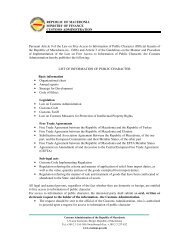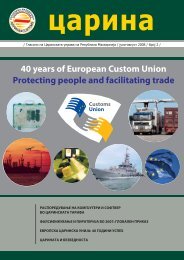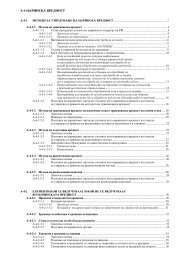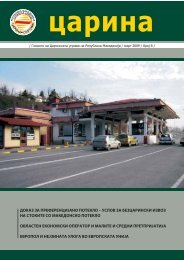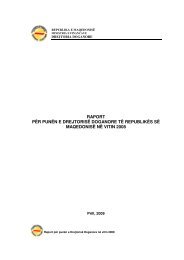REGIONAL COOPERATION AND ECONOMIC INTEGRATION
REGIONAL COOPERATION AND ECONOMIC INTEGRATION
REGIONAL COOPERATION AND ECONOMIC INTEGRATION
Create successful ePaper yourself
Turn your PDF publications into a flip-book with our unique Google optimized e-Paper software.
CEFTA-2006 <strong>AND</strong> ANHANCING COMPETITIVENESS OF THE REGION - SOME SECTORAL ASPECTS<br />
result, practitioners in the development field have focused their attention more and more to<br />
reforms intended to improve law and legal institutions. Multilateral institutions such as the<br />
World Bank and many policymakers throughout the world believe the rule of law promotes<br />
economic development.<br />
Law is important to the market economy because it is the common basis on which parties<br />
can make agreements; it provides parties with confidence that disputes can be resolved<br />
efficiently and fairly. For this reason, the predictability and order that the rule of law<br />
promotes in substantive laws is viewed as the stabilizing force behind much economic<br />
development. The rule of law helps set the “rules of the game” in critical areas such as<br />
investments, property, and contracts.<br />
The rule of law also serves as an important assurance of social rights and government<br />
accountability. Governmental restraint is especially critical for many transition economies<br />
where a previously planned economy is to be transformed into one that is market-based.<br />
When the government is no longer the sole owner of land, capital, and labor, the rule<br />
of law guarantees that the crucial elements of the economy will be free from arbitrary<br />
governmental actions. The rule of law thus assures market participants that the government<br />
will adopt a hands-off approach to investments and production, allowing those participants<br />
to fully exercise their rights in relation to land, labor and capital.<br />
The efficiency of the courts is an important component in rule of law reforms as the existence<br />
of a judiciary is a fundamental aspect of the rule of law. At the most basic level, this simply<br />
meant that courts needed to be available to adjudicate disputes and enforce resolutions. For<br />
countries that are further along in the reform process, more complex structural reforms that<br />
strengthen court capacity, independence, and transparency are needed.<br />
To increase accountability and transparency, information technology systems may be<br />
installed to provide greater public access. To increase independence of the courts, the<br />
government can provide them with funding that will allow them to make their own financial<br />
and administrative decisions. Furthermore, for countries that have already established<br />
these structural reforms, to encourage the adoption of the rule of law, court performance<br />
should be evaluated on a periodic basis. Independence, accountability, efficiency, access,<br />
affordability, alternative dispute resolution mechanisms, and the quality of professionals<br />
are some of the characteristics that may provide an accurate measurement of the system’s<br />
success.<br />
Another important rule of law reform goal is to build the legal rules. As Fuller stated,<br />
“laws must exist” (Fuler, 1999, pp. 49). Economic reforms have generated a large number<br />
of new economic laws in developing countries. Between 1990 and 1995, 45 developing<br />
and former socialist countries enacted new investment laws or codes covering a wide range<br />
of areas. Many of these investment laws were passed to liberalize the existing investment<br />
regime in the developing country by offering clear and broad legal protection for all types<br />
of investments.<br />
To encourage additional country-specific development, in the early 1990s the World Bank<br />
and the International Monetary Fund (IMF) began conditioning financial assistance on the<br />
implementation of the rule of law in recipient countries. These organizations provided aid<br />
to support initiatives in legislative drafting, legal information, public and legal education,<br />
and judicial reforms, including alternative dispute resolution. By conditioning funds on<br />
271



